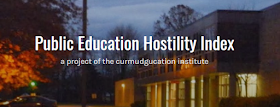This exchange turned up on my Twitter feed.
I'm going to try to answer this question, because I think it's a legitimate one.
Caveats first. Yes, the MFL tweet is kind of a non-sequitor. And yes, there are plenty of reasons to suspect that Moms for Liberty is a group at least as interested in being political players as they are in safeguarding children (e.g. this outburst at one of their events). But I'll engage with anyone who appears to be making a good faith effort to discuss issues. Also, I'm a parent, and I get the kind of gut-level nervousness that comes with entrusting your child to people who may or may not share your values. So I'm going to attempt a serious answer to what may or may not be a serious ask.
This is my reply to Moms for Liberty.
What should a parent who finds "these books" in the school library do?
Step one, in all times you're dealing with a school, is to assume good intent. Start with the assumption that the school is staffed and run by people who value children and helping them grow to be their best selves, who went into education because they did, in fact, want to teach children. If you start out with the assumption that public schools are actually a sinister conspiracy to indoctrinate children or an elaborate scam being run to fill the coffers of teachers unions, it will be hard to find any basis to move forward.
Also, assuming ill will and searching for gotcha's will lead you to make absurd accusations. If you assume evil intent and the whole purpose of your search is to "catch them" being evil, you might as well withdraw your child and enroll in some private school now. But in general I believe that it is always better to search for understanding rather than confirmation of your already-formed beliefs, in part because you will always find confirmation, whether it's there or not.
Next. Have friends or people you trust outside your bubble with whom to check your work. I have to believe that if the lady who objected to the sexy seahorse book had turned to someone outside the group and asked if she was really seeing something objectionable or not, someone would have told her to calm down.
If you are certain in your heart that you do not want your child exposed to a certain book, you should next check the chain of command in your local district. Probably the most common mistake made by parents with a school complaint is addressing that complaint to someone who has no power to address the complaint. So who oversees book acquisition for your school library? Is there a procedure in place to challenge a book? What the circumstances under which a child goes to the library--with a particular class, or during a study hall, or barely ever (some students go a long time without ever seeing the inside of a library)? If your circulation system is computerized, is there a way to monitor what your child checks out? Are some books in the library kept in the back room and available only on request (school libraries do this for a variety of reasons)? Can you file a request with the librarian that your child not be allowed to have access to certain books?
When you identify the people involved, talk to them. Make yourself available for a human conversation (e-mail and texting often lead to misunderstandings of tone in charged conversations). Share your concerns, and listen to their response. If you are unhappy with the outcome, then move up through the chain of command.
Please note: all of the above is in reference to access to one of "these books" for your own child. When you want to ban access to the book for all students in the school, we're entering a whole new conversation. You do not like it when you feel that the school is substituting their judgment for your own parental judgment; how should your neighbors feel when you insist on substituting your own judgment for theirs?
What we've seen so far on the lists of "these books" range from books that probably cross the line for a lot of folks to books that are primarily objectionable to racists. The demands to get rid of books (e.g. I Am Rosa Parks) that are simply an accurate portrayal of historical events in which white folks did not handle themselves very well are not supportable. I'm willing to listen to someone's explanation of why they are bad for children, but I honestly cannot imagine what a good explanation would be. Some of these may very well make some children sad. It's not clear to me why that is a bad thing.
The list of "these books" has become really broad and wide, with some of it way into Chinese Communist re-education camp territory, and the longer this wrangling goes, the more conservatives are twisting themselves into pretzels trying to not look racist while still backing racist book bans. Since the new governor of Virginia won a campaign by attacking a major novel by arguably the greatest American author in recent history, I'm not confident that this is going to end any time soon.
The thing is--banning a book is huge, huge deal. Having it pulled from a school library in an attempt to keep it away from students is a huge, huge deal. Not only that, but it doesn't work. The good people of Boston banned Huckleberry Finn (too much friendliness between a white boy and a Black man), and they turned it into a best seller. I guarantee you that the books that have turned up on these current banning lists are now being sought out by the students MFL wanted to protect.
I see a huge irony in your current movement. Many of your folks are also anti-vax and anti-mask, arguing that simply letting students be exposed to the virus will not be a problem because natural immunity and their own strength will protect them. And yet when it comes to "these books," the approach is to prevent exposure at all costs.
I taught high school and middle school English for 39 years. Students mostly grow up to be the people their parents set them up to be. Sometimes that means they grow up and hold onto their parents' values every step of the way. Sometimes they grow up and their experience leads them to move away from their parents' values because they see a world that does not match what their parents described. But books from the school library rarely, if ever, have a role in that process.
So I guess the last big step I'd offer is to trust your children. Talk to them about the books in question. If you have raised them well, with a string foundation in morals and decency, nothing they see in a book that they found in the school library is going to suddenly alter their world view. And if you have tried to raise them with a stunted, fragile worldview, nothing you can do will keep that from being shattered by the world at some point.
As with many issues in the country, involving politicians who care far less about student well-being than about identifying an issue that can win them some votes--well, those folks are not going to help. Unfortunately, they're about to be all over this, and that's not going to help anybody.












